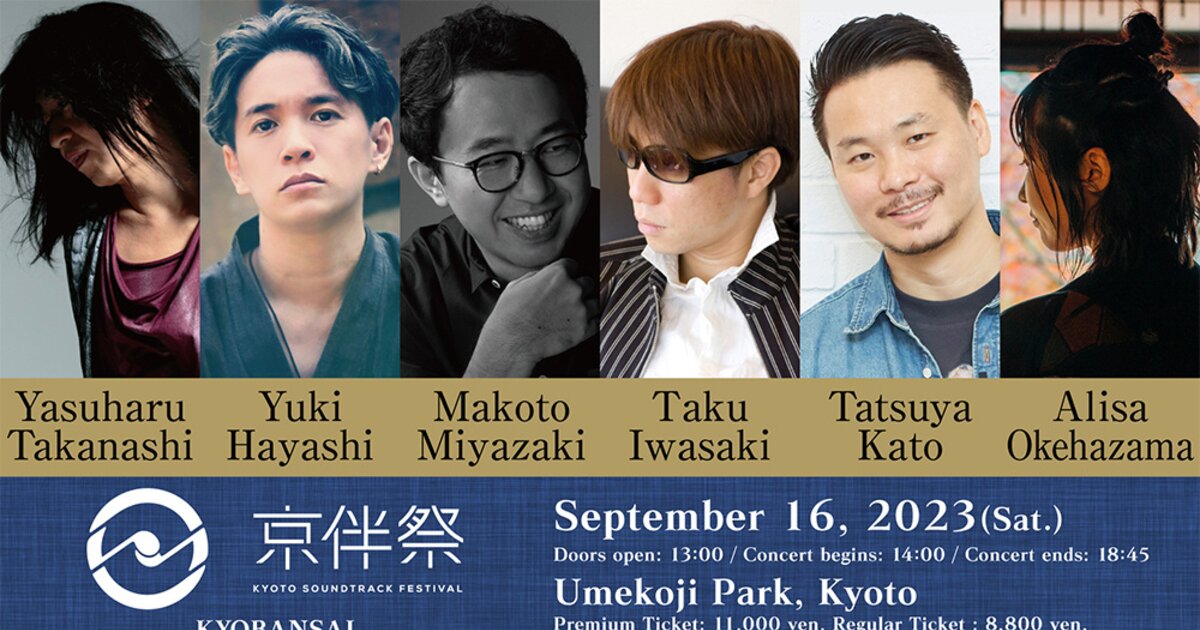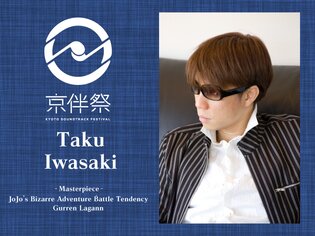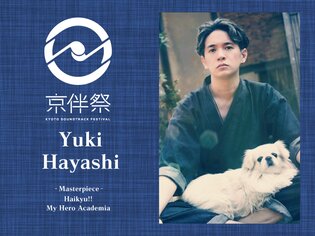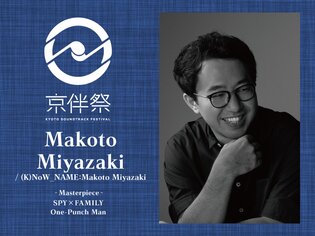
The Kyoto Soundtrack Festival, called Kyobansai, is a music festival taking place in Kyoto on September 16, 2023. This festival celebrates anime soundtrack and the very important role it plays in creating a series’ atmosphere. Six legendary composers are participating in the Kyobansai with an amazing roster of series under their belts ranging from Jujutsu Kaisen to Free!
The composers participating in the Kyobansai have graciously agreed to answer TOM’s interview questions so they could share their points of view with all of their international fans! We’re splitting up their answers into two articles with the second part being posted next week, so make sure to check both out once they’re up!
Part 1 features Makoto Miyazaki, composer of soundtracks for series like Spy x Family, One Punch Man, and Zom 100: Bucket List of the Dead; Yuki Hayashi, who has composed for My Hero Academia, Haikyu!!, and Karakuri Circus; and Taku Iwasaki, known for Bungo Stray Dogs, Gurren Lagann, and Jojo’s Bizarre Adventure: Battle Tendency.
TOM: What’s your process when composing for a new series?
Miyazaki: First, I read the original work and any scripts that are ready at that point very thoroughly. I also mark down any lines that stand out to me as being very important in the story. After that, we have meetings where we discuss how certain scenes and lines will be animated. If the director has a theme (type of genre and/or instruments) that they want to use for the story, I’ll follow that, and I’ll start building the musical story in my head, such as how to reuse the main melody and how the music will develop from the first scene to the last. By the time I’m ready to actually work on it, I’ve finished most of it in my head, so then all I have left is to refine it.
Hayashi: I read the original work first, then I make sounds that I believe fit the image in my head, the series’ universe, and what I think are cool and emotional.
Iwasaki: After reading the script and the storyboard and looking over any notes I get from the director, I make a composition chart and a template for the digital audio workspace before I start composing the music.

TOM: Has your process changed since the beginning of your career, and if so, how?
Miyazaki: This sounds like a contradiction, but I’ve stopped thinking of music as music. I’ve started purely adding music to go with the characters’ emotions and the scenes. I play music as if I’m speaking. It might be more accurate to say that the music is explaining the scene in more detail. In the past, I used to use musical theory to compose music, and while that is in no way meaningless, I realized that it wasn’t a creative way to produce an artwork.
Hayashi: Before I worked on anime, I worked a lot on live-action films. In comparison to then, I now make music with a richer and more colorful variation of musical genres, tempos, and instruments.
Iwasaki: Lately, I haven’t written my own music scores. Of course, I do orchestrate it. I used to compose, write the music, and play and record the synthesizers all by myself, but now I hire assistants for tasks not related to composition.
TOM: Where do you find inspiration for your work?
Miyazaki: I love watching movies, so I feel like I’m naturally impacted by that. Because of my job, no matter where I am, I notice the music. Music is indispensable to our daily lives, so no matter where I am, such as the supermarket or with my children at an amusement park, I’m able to find musical hints.
Also, I do my best to compose music entirely in my head without playing a single instrument. If I use an instrument, my performance quirks will come out in the music, so I can’t make any fresh sounds while the music inside my mind is infinite.
Hayashi: It’s very difficult to find the sound that fits a series.
There are some times when the answer flashes easily in my head, but it often doesn’t happen that way. When it doesn’t, I worry about it for a long time.
As a result, I get plenty of choices, and eventually the perfect answer that suits my desire comes to me like a complete jigsaw puzzle coming together.
I’m always thinking about the series to make that happen. It’s a struggle, but it’s also very fun since I’m doing what I like to do.
Iwasaki: I crawl around in my own brain looking for music.
TOM: What series do you have any particular emotion toward or was a particularly stand-out experience?
Miyazaki: That would be One Punch Man. At the time, I was struggling a little with a fixation on the kind of music that soundtracks should use. However, when I was meeting with the director of OPM, he told me to forget about making a soundtrack and instead to enjoy making music that I thought was cool.
As a result, I ended up making music that many people have praised. It made me learn that, to make people enjoy and feel something for the series, I need to enjoy myself, too.
Hayashi: There are a lot of series that fit that for me, so this question was hard to answer, but I like Run with the Wind and Insomniacs After School.
I’m often in charge of exciting and aggressive series, so I enjoyed looking for the perfect music that suited these series and their quiet yet strong faith that gradually swells with each episode and the beautiful, transient world views.

Iwasaki: Gurren Lagann. The work that was least suited to my musical style was my most financially successful one.
TOM: Have you noticed any new trends in anime/game OSTs?
Miyazaki: I think people are using more electric sounds lately. The sounds of synthesizers and orchestras have a high affinity, so you can create a deep sound. Recently, the boundary between the frequency bands of synthesizers and orchestras has disappeared, and synthesizers have been able to make a more organic sound while orchestras are able to make a denser sound.
Hayashi: There are more composers from all over the world now, and there are many more concerts featuring background music as well.
Both of these things are great, so I want both of them to continue increasing.
Iwasaki: There has been an increase in the use of different pulses as well as drone music.
TOM: How do you feel about participating in events such as the Kyobansai?
Miyazaki: This is a chance to have more people listen to anime soundtracks as well as a chance to have people fall in love with series that use those soundtracks. I believe we have a duty to connect this chance with the next generation.
Hayashi: The Kyobansai is an event that I want to stake my life on to bring Japanese soundtracks to the world. I want even just one more person to know all about our unique music coming from Kyoto and Japan to the world.
Iwasaki: I hope it goes off without a hitch.
TOM: What have you been listening to lately in your private life?
Miyazaki: I often listen to the Black Adam soundtrack. These are a little older now, but also the soundtrack for Netflix’s The Witcher and 2WEI, a composer duo who make epic-style music.

Hayashi: I listen to music a lot for work, so I don’t really listen to music in my private life. However, for my son’s summer homework, I helped him write and record a song so I’ve been listening to it for so long it’s constantly stuck in my head.
Check out his son's song here!
Iwasaki: Kendrick Lamar, The Lounge Lizards, and Ligeti.
TOM: How does it feel knowing that your work has reached so many people outside of Japan?
Miyazaki: I’m delighted. It makes me feel that composers are able to bring not just music, but also intense feelings to people all around the world regardless of borders or language, which then makes me believe that this is the best job in the world. From the bottom of my heart, I’m happy to be working as an anime soundtrack composer.
Hayashi: I never imagined that this would happen in my life, so I’m very grateful to anime, one of the types of pop culture that Japan is proudest of. I also want to continue working hard so that more people can know about soundtracks as music. Thank you very much!
Iwasaki: It is not that my music reached the whole world. It was anime and anime music that spread around the world.
Thank you so much to these three for answering our questions! We’re looking forward to seeing them perform at the Kyobansai and for any new projects he and the other performers will work on in the future. Don’t forget that part 2 of this interview will be available on TOM News next week!
Now, if you’re interested in watching the Kyobansai yourself, you can buy online tickets from anywhere in the world on the English homepage here.
Please show your support for these composers by watching the show wherever you are in the world!



0 Comments